The vegan vitamin D3 supplements market's trajectory from USD 596.4 million in 2025 to USD 935.0 million by 2035 represents robust expansion, demonstrating accelerating adoption of plant-based nutritional solutions and growing investment in alternative vitamin D production technologies across dietary supplement manufacturers, health-focused retailers, and wellness-oriented consumers worldwide.
The vegan vitamin D3 supplements market operates within a dynamic landscape characterized by expanding plant-based nutrition awareness, dietary supplement innovation initiatives, and growing demand for cruelty-free vitamin D alternatives across health-conscious consumers, vegan lifestyle adherents, and nutritionally aware demographics. Market dynamics reflect increasing investment in plant-based supplement development, accelerating adoption of algae-derived vitamin D3 technologies, and rising demand for ethical nutritional solutions that support diverse dietary preferences and wellness methodologies.
Consumer purchasing patterns demonstrate shifting preferences toward plant-based supplement systems that combine bioavailability optimization, ethical sourcing practices, and transparent manufacturing processes. Health retailers and supplement distributors prioritize product efficacy, ingredient transparency, and ethical manufacturing when selecting vitamin D3 solutions for consumers seeking plant-based alternatives to traditional animal-derived supplements.
The vegan vitamin D3 supplements market benefits from expanding health consciousness across wellness, vegan lifestyle, and preventive healthcare sectors, driving demand for sophisticated nutritional products that enable comprehensive vitamin D optimization procedures. Growing emphasis on ingredient transparency and ethical consumption creates opportunities for manufacturers offering validated supplement systems with comprehensive documentation and quality assurance capabilities.
Technology advancement influences market evolution through integration of advanced extraction processes, bioavailability enhancement techniques, and improved formulation technologies that improve supplement effectiveness and nutritional outcomes. Manufacturers focus on developing vitamin D3 solutions that accommodate varying dosage requirements, delivery formats, and absorption profiles while maintaining optimal potency throughout extended storage periods.
The vegan vitamin D3 supplements market demonstrates strong growth fundamentals driven by expanding health awareness, ethical consumption preferences, and increasing demand for plant-based nutritional alternatives across multiple consumer demographics and wellness applications.
The first half of the decade (2025-2030) will witness market growth from USD 596.4 million to approximately USD 746.7 million, adding USD 150.3 million in value, representing 44% of the total forecast period expansion. This phase will be characterized by rapid adoption of algae-derived vitamin D3 technologies, driven by vegan lifestyle expansion and increasing demand for cruelty-free supplement solutions across wellness applications.
The latter half (2030-2035) will experience accelerated growth from USD 746.7 million to USD 935.0 million, representing an addition of USD 188.3 million or 56% of the decade's expansion. This period will be defined by mass market penetration of advanced plant-based vitamin D3 formulations, integration with personalized nutrition platforms, and seamless connectivity with existing wellness infrastructure.
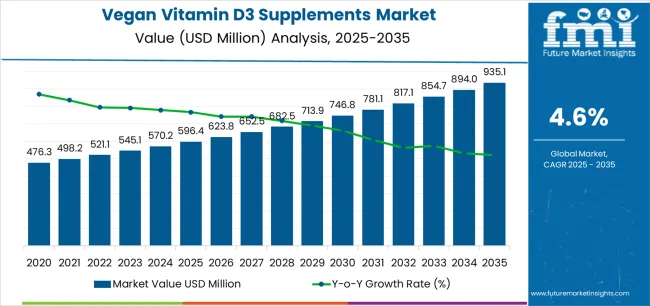
| Period | Primary Revenue Buckets | Share | Notes |
|---|---|---|---|
| Today | Liquid preparations (health optimization) | 52% | Premium formulations, specialty retailers |
| Tablet formulations | 38% | Conventional distribution, mass market | |
| Other formats (capsules, gummies) | 10% | Emerging formats, targeted demographics | |
| Future (3-5 yrs) | Advanced liquid systems | 48-51% | Enhanced bioavailability, premium positioning |
| High-potency tablet systems | 32-35% | Standardized dosing, convenience focus | |
| Online sales channels | 45-52% | Direct-to-consumer, subscription models | |
| Offline retail channels | 48-55% | Health stores, pharmacy distribution | |
| Specialized formats | 12-18% | Gummies, sprays, innovative delivery |
| Metric | Value |
|---|---|
| Market Value (2025) | USD 596.4 million |
| Market Forecast (2035) | USD 935.0 million |
| Growth Rate | 4.6% CAGR |
| Leading Product | Liquid Preparations |
| Primary Distribution | Online Sales Segment |
The vegan vitamin D3 supplements market demonstrates strong fundamentals with liquid preparation systems capturing dominant share through advanced bioavailability optimization and premium positioning strategies. Online sales channels drive primary distribution, supported by increasing direct-to-consumer preferences and subscription-based purchasing initiatives. Geographic distribution remains concentrated in developed markets with established health-conscious consumer bases, while emerging economies show accelerating adoption rates driven by wellness awareness programs and rising disposable income levels.
Primary Classification: The market segments by product into liquid preparations, tablets, and other formats, representing evolution from traditional vitamin supplementation to sophisticated plant-based nutritional technologies for comprehensive wellness optimization.
Secondary Classification: Distribution channel segmentation divides the vegan vitamin D3 supplements market into online sales and offline sales, reflecting distinct consumer preferences for purchasing convenience, product education, and wellness consultation requirements.
Tertiary Classification: End-use segmentation covers health-conscious consumers, vegan lifestyle adherents, wellness enthusiasts, preventive healthcare users, and nutritional supplement consumers, while geographic distribution spans direct-to-consumer platforms, health retailers, pharmacies, and specialized wellness stores.
Regional Classification: Geographic distribution covers North America, Latin America, Western Europe, Eastern Europe, East Asia, South Asia Pacific, and Middle East & Africa, with developed markets leading adoption while emerging economies show accelerating growth patterns driven by wellness awareness development programs.
The segmentation structure reveals technology progression from traditional vitamin D supplementation toward sophisticated plant-based nutritional systems with enhanced bioavailability capabilities, while distribution diversity spans from conventional retail to specialized wellness consultation platforms requiring comprehensive nutritional optimization solutions.
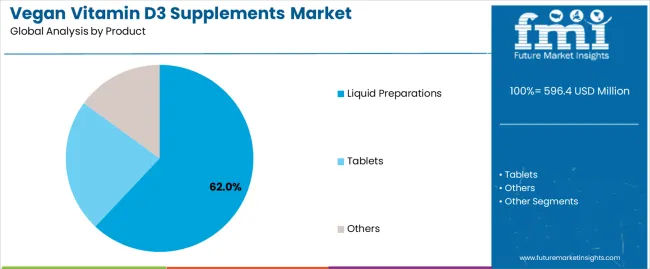
Market Position: Liquid preparation vitamin D3 systems command the leading position in the vegan vitamin D3 supplements market with 62% market share through proven bioavailability technologies, including efficient absorption mechanisms, precise dosage control, and wellness optimization that enable health-conscious consumers to achieve optimal vitamin D levels across diverse nutritional and lifestyle environments.
Value Drivers: The segment benefits from consumer preference for high-absorption supplement systems that provide consistent bioavailability, optimal potency, and wellness flexibility without requiring large tablet consumption. Advanced liquid processing features enable enhanced absorption rates, precise dosage customization, and integration with existing wellness systems, where nutritional precision and bioavailability represent critical health requirements.
Competitive Advantages: Liquid preparation vitamin D3 systems differentiate through proven absorption effectiveness, flexible dosage characteristics, and integration with established wellness management systems that enhance nutritional outcomes while maintaining optimal bioavailability standards suitable for diverse consumer applications.
Key market characteristics:
Tablet vitamin D3 systems maintain a 38% market position in the vegan vitamin D3 supplements market due to their standardized dosage advantages and mass market accessibility benefits. These products appeal to consumers requiring convenient supplementation solutions with predictable dosing profiles for routine wellness operations. Market growth is driven by retail distribution expansion, emphasizing standardized supplement solutions and operational convenience through optimized manufacturing designs.
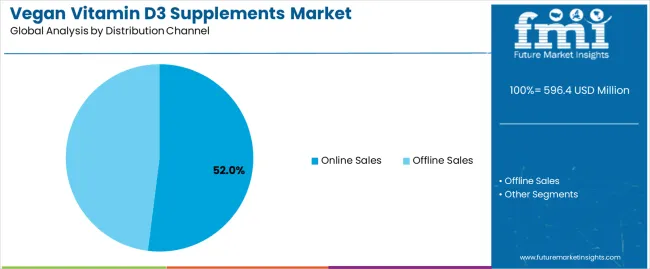
Market Context: Online sales channels demonstrate strong growth in the vegan vitamin D3 supplements market, holding a 52% share due to the widespread adoption of direct-to-consumer purchasing and an increasing focus on wellness education, subscription services, and personalized nutrition consultations that maximize consumer convenience while maintaining product quality standards.
Appeal Factors: Online consumers prioritize product transparency, educational resources, and integration with existing wellness platforms that enable coordinated health management across multiple nutritional protocols. The segment benefits from substantial e-commerce investment and digital wellness programs that emphasize acquisition of premium supplement systems for health optimization and nutritional management applications.
Growth Drivers: Digital wellness programs incorporate vegan vitamin D3 supplements as essential components for preventive health operations, while subscription services increase demand for consistent supplementation capabilities that comply with wellness standards and minimize nutritional variability.
Market Challenges: Product authentication and quality verification complexity may limit standardization across different online platforms or wellness scenarios.
Distribution dynamics include:
Offline sales channels capture 48% market share through health store requirements in retail pharmacies, wellness centers, and specialty nutrition applications. These channels demand high-quality supplement systems capable of supporting consumer education protocols while providing product verification and consultation reliability capabilities.
| Category | Factor | Impact | Why It Matters |
|---|---|---|---|
| Driver | Vegan lifestyle expansion & plant-based nutrition adoption (ethical consumption, dietary preferences) | ★★★★★ | Growing vegan market requires plant-based vitamin D3 alternatives with enhanced bioavailability capabilities and ethical sourcing properties proven effective across wellness applications. |
| Driver | Health consciousness advancement & preventive wellness (vitamin D deficiency awareness, immune health focus) | ★★★★★ | Transforms wellness requirements from "basic supplementation" to "optimized nutritional management"; consumers that adopt advanced plant-based supplements and monitoring features gain health advantages. |
| Driver | E-commerce expansion & digital wellness integration (online purchasing, subscription services) | ★★★★☆ | Modern consumers need sophisticated, convenient supplement access; demand for automated and integrated wellness solutions expanding addressable market. |
| Restraint | Higher product cost & premium pricing (compared to conventional vitamin D3 supplements) | ★★★★☆ | Price-sensitive consumers defer plant-based supplement adoption; increases cost barriers and slows premium product uptake in conventional supplement markets. |
| Restraint | Limited production capacity & supply chain constraints (algae-sourcing limitations, manufacturing complexity) | ★★★☆☆ | Traditional vitamin D3 alternatives offer established supply chains and lower costs, potentially limiting vegan supplement adoption in price-conscious applications. |
| Trend | Bioavailability enhancement & formulation advancement (absorption optimization, potency improvement) | ★★★★★ | Advanced absorption properties, wellness optimization, and health analytics transform operations; technology integration and performance enhancement become core value propositions. |
| Trend | Personalized nutrition & wellness connectivity (individualized dosing, health platform integration) | ★★★★☆ | Smart supplementation systems for specific health applications and protocols; specialized monitoring and targeted optimization capabilities drive competition toward connected solutions. |
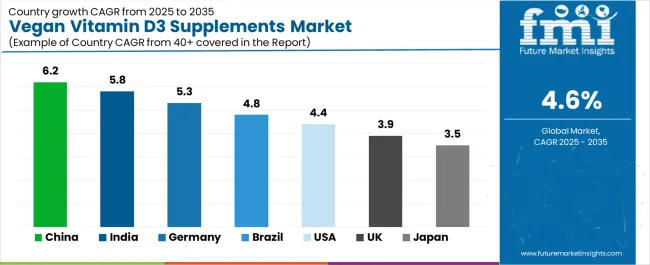
The vegan vitamin D3 supplements market demonstrates varied regional dynamics with Growth Leaders including China (6.2% growth rate) and India (5.8% growth rate) driving expansion through wellness awareness development and plant-based nutrition modernization initiatives. Steady Performers encompass Germany (5.3% growth rate), Brazil (4.8% growth rate), and developed regions, benefiting from established health-conscious consumer bases and wellness sector growth. Mature Markets feature United States (4.4% growth rate), United Kingdom (3.9% growth rate), and Japan (3.5% growth rate), where preventive healthcare advancement and nutritional optimization requirements support consistent growth patterns.
Regional synthesis reveals East Asian markets leading adoption through wellness expansion and plant-based nutrition development, while North American countries maintain steady expansion supported by preventive healthcare advancement and health-conscious consumer investment. European markets show strong growth driven by ethical consumption applications and wellness integration trends.
| Region/Country | 2025-2035 Growth | How to win | What to watch out |
|---|---|---|---|
| China | 6.2% | Focus on premium wellness solutions | Regulatory changes; local competition |
| India | 5.8% | Lead with affordable plant-based systems | Import restrictions; infrastructure barriers |
| Germany | 5.3% | Provide premium ethical supplements | Over-regulation; lengthy approvals |
| Brazil | 4.8% | Offer value-oriented wellness solutions | Currency fluctuations; import duties |
| United States | 4.4% | Push digital integration | Compliance costs; scaling challenges |
| United Kingdom | 3.9% | Focus on ethical consumption | Economic impacts; consumer spending |
| Japan | 3.5% | Emphasize quality manufacturing | Traditional preferences; adoption rates |
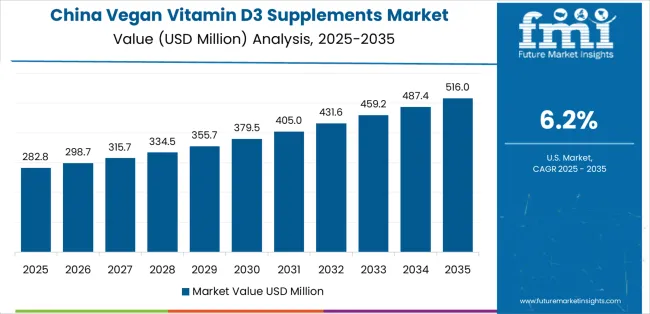
China establishes fastest market growth through aggressive wellness infrastructure development programs and comprehensive health-conscious consumer expansion, integrating advanced vegan vitamin D3 systems as standard components in urban wellness centers and health-focused retail chains. The country's 6.2% growth rate reflects consumer initiatives promoting plant-based nutrition and domestic wellness capabilities that mandate use of premium supplement systems in preventive health and nutritional optimization facilities. Growth concentrates in major urban centers, including Beijing, Shanghai, and Guangzhou, where wellness development showcases integrated nutritional systems that appeal to health-conscious consumers seeking bioavailability optimization capabilities and wellness applications.
Chinese manufacturers are developing cost-effective supplement solutions that combine domestic production advantages with advanced plant-based features, including enhanced bioavailability and improved wellness capabilities. Distribution channels through e-commerce platforms and health retailers expand market access, while consumer health awareness supports adoption across diverse wellness and preventive healthcare segments.
Strategic Market Indicators:
In Mumbai, Delhi, and Bangalore, wellness facilities and health-conscious consumers are implementing vegan vitamin D3 supplement systems as standard products for nutritional optimization and wellness management applications, driven by increasing disposable income and health awareness programs that emphasize importance of premium nutritional capabilities. The vegan vitamin D3 supplements market holds a 5.8% growth rate, supported by wellness modernization initiatives and consumer health programs that promote advanced supplement systems for urban and health-focused demographics. Indian consumers are adopting supplement systems that provide consistent bioavailability and wellness features, particularly appealing in urban regions where nutritional optimization and health excellence represent critical wellness requirements.
Market expansion benefits from growing e-commerce capabilities and international wellness partnerships that enable domestic distribution of advanced supplement systems for health and preventive wellness applications. Technology adoption follows patterns established in wellness products, where bioavailability and effectiveness drive purchasing decisions and operational deployment.
Market Intelligence Brief:
Advanced wellness market in Germany demonstrates sophisticated vegan vitamin D3 deployment with documented bioavailability effectiveness in health applications and wellness facilities through integration with existing nutritional systems and wellness infrastructure. The country leverages engineering expertise in supplement technologies and ethical consumption integration to maintain a 5.3% growth rate. Wellness centers, including Bavaria, Baden-Württemberg, and North Rhine-Westphalia, showcase premium installations where supplement systems integrate with comprehensive wellness platforms and health management systems to optimize nutritional effectiveness and wellness outcomes.
German manufacturers prioritize product quality and EU compliance in supplement development, creating demand for premium systems with advanced features, including wellness integration and health monitoring systems. The vegan vitamin D3 supplements market benefits from established ethical consumption infrastructure and willingness to invest in advanced nutritional technologies that provide long-term health benefits and compliance with international wellness standards.
Market Intelligence Brief:
Brazil's market expansion benefits from diverse wellness demand, including health modernization in São Paulo and Rio de Janeiro, consumer facility upgrades, and wellness programs that increasingly incorporate plant-based supplementation solutions for nutritional applications. The country maintains a 4.8% growth rate, driven by rising health consciousness and increasing recognition of plant-based nutrition benefits, including ethical consumption and enhanced wellness effectiveness.
Market dynamics focus on value-oriented supplement solutions that balance bioavailability performance with affordability considerations important to Brazilian health-conscious consumers. Growing wellness adoption creates continued demand for modern supplement systems in new health infrastructure and consumer modernization projects.
Strategic Market Considerations:
United States establishes market leadership through comprehensive wellness programs and advanced preventive healthcare infrastructure development, integrating vegan vitamin D3 systems across health-conscious consumers and wellness applications. The country's 4.4% growth rate reflects established wellness relationships and mature nutritional supplement adoption that supports widespread use of plant-based supplement systems in preventive health and wellness facilities. Growth concentrates in major wellness markets, including California, New York, and Texas, where health technology showcases mature deployment that appeals to health-conscious consumers seeking proven bioavailability capabilities and nutritional optimization applications.
American wellness providers leverage established distribution networks and comprehensive educational support capabilities, including wellness programs and consultation support that create consumer relationships and operational advantages. The vegan vitamin D3 supplements market benefits from mature regulatory standards and wellness requirements that mandate supplement quality while supporting technology advancement and nutritional optimization.
Market Intelligence Brief:
United Kingdom's wellness market demonstrates integrated vegan vitamin D3 deployment with documented bioavailability effectiveness in health applications and wellness facilities through integration with existing nutritional systems and wellness infrastructure. The country maintains a 3.9% growth rate, supported by ethical consumption programs and wellness effectiveness requirements that promote plant-based supplement systems for health applications. Wellness facilities across England, Scotland, and Wales showcase systematic installations where supplement systems integrate with comprehensive wellness platforms to optimize bioavailability and nutritional outcomes.
UK wellness providers prioritize product quality and ethical compatibility in supplement procurement, creating demand for validated systems with proven bioavailability features, including wellness monitoring integration and health management systems. The vegan vitamin D3 supplements market benefits from established ethical consumption infrastructure and quality standards that support the adoption of nutritional technologies and the effectiveness of wellness.
Market Intelligence Brief:
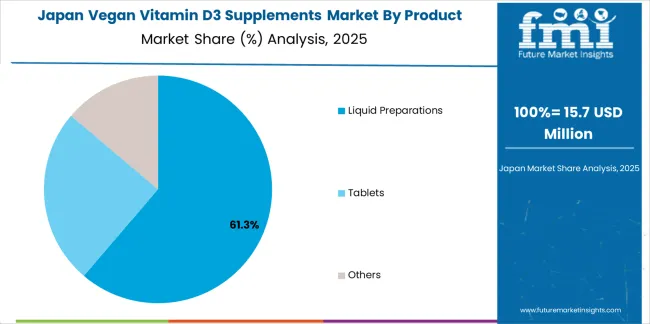
Japan's market growth benefits from premium wellness demand, including advanced health facilities in Tokyo and Osaka, quality integration, and wellness enhancement programs that increasingly incorporate supplementation solutions for nutritional applications. The country maintains a 3.5% growth rate, driven by health technology advancement and increasing recognition of plant-based nutrition benefits, including quality bioavailability and enhanced wellness outcomes.
Market dynamics focus on high-quality supplement solutions that meet Japanese wellness standards and bioavailability effectiveness requirements important to health-conscious consumers. Advanced wellness technology adoption creates continued demand for sophisticated supplement systems in health facility infrastructure and wellness modernization projects.
Strategic Market Considerations:
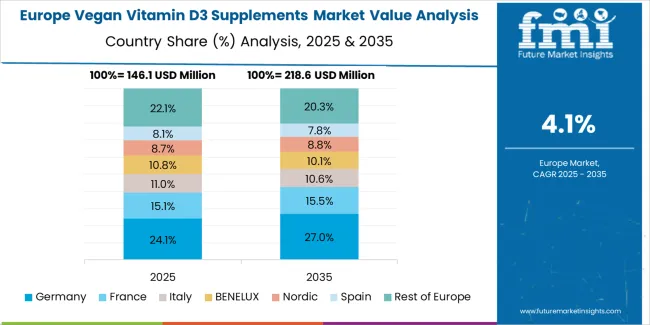
The European vegan vitamin D3 supplements market is projected to grow from USD 118.7 million in 2025 to USD 172.3 million by 2035, registering a CAGR of 3.7% over the forecast period. Germany is expected to maintain its leadership position with a 38.6% market share in 2025, supported by its advanced ethical consumption infrastructure and major wellness centers.
United Kingdom follows with a 31.2% share in 2025, driven by comprehensive wellness programs and preventive healthcare initiatives. France holds a 16.8% share through specialized health applications and ethical consumption requirements. Italy commands a 7.9% share, while Spain accounts for 5.5% in 2025. The rest of Europe region is anticipated to gain momentum, expanding its collective share from 2.4% to 2.7% by 2035, attributed to increasing wellness adoption in Nordic countries and emerging health facilities implementing nutritional modernization programs.
| Stakeholder | What they actually control | Typical strengths | Typical blind spots |
|---|---|---|---|
| Global brands | Distribution reach, broad product catalogs, brand recognition | Wide availability, proven bioavailability, multi-region support | Product refresh cycles; consumer dependency on brand validation |
| Technology innovators | Supplement R&D; advanced bioavailability technologies; enhanced wellness properties | Latest technologies first; attractive ROI on wellness effectiveness | Service density outside core regions; scaling complexity |
| Regional specialists | Local compliance, fast delivery, nearby consumer support | "Close to consumer" support; pragmatic pricing; local regulations | Technology gaps; talent retention in consumer service |
| Full-service providers | Complete wellness programs, health integration, wellness monitoring | Lowest operational risk; comprehensive support | Service costs if overpromised; technology obsolescence |
| Niche specialists | Specialized formulations, custom systems, wellness services | Win premium applications; flexible configurations | Scalability limitations; narrow market focus |
| Item | Value |
|---|---|
| Quantitative Units | USD 596.4 million |
| Product | Liquid Preparations, Tablets, Others |
| Distribution Channel | Online Sales, Offline Sales |
| Application | Health Optimization, Nutritional Supplementation, Wellness Management, Preventive Healthcare, Dietary Enhancement |
| End Use | Health-Conscious Consumers, Vegan Lifestyle Adherents, Wellness Enthusiasts, Preventive Healthcare Users, Nutritional Supplement Consumers |
| Regions Covered | North America, Latin America, Western Europe, Eastern Europe, East Asia, South Asia Pacific, Middle East & Africa |
| Countries Covered | China, India, Germany, Brazil, United States, United Kingdom, Japan, Canada, France, Australia, and 25+ additional countries |
| Key Companies Profiled | Vegetology, Cytoplan, Sweet Cures, Lamberts Healthcare, Healthspan, Solgar, DR.VEGAN, Biogen, Life Extension, Inlife Pharma |
| Additional Attributes | Dollar sales by product and distribution categories, regional adoption trends across East Asia, North America, and Western Europe, competitive landscape with wellness companies and supplement manufacturers, consumer preferences for bioavailability effectiveness and ethical sourcing, integration with health platforms and wellness management systems, innovations in plant-based vitamin D3 technology and wellness enhancement, and development of advanced supplement solutions with enhanced bioavailability and nutritional optimization capabilities. |
The global vegan vitamin d3 supplements market is estimated to be valued at USD 596.4 million in 2025.
The market size for the vegan vitamin d3 supplements market is projected to reach USD 935.1 million by 2035.
The vegan vitamin d3 supplements market is expected to grow at a 4.6% CAGR between 2025 and 2035.
The key product types in vegan vitamin d3 supplements market are liquid preparations , tablets and others.
In terms of distribution channel, online sales segment to command 52.0% share in the vegan vitamin d3 supplements market in 2025.






Full Research Suite comprises of:
Market outlook & trends analysis
Interviews & case studies
Strategic recommendations
Vendor profiles & capabilities analysis
5-year forecasts
8 regions and 60+ country-level data splits
Market segment data splits
12 months of continuous data updates
DELIVERED AS:
PDF EXCEL ONLINE
Vegan Cheese Market Size and Share Forecast Outlook 2025 to 2035
Vegan Confectionery Market Size and Share Forecast Outlook 2025 to 2035
Vegan Steak Market Size and Share Forecast Outlook 2025 to 2035
Vegan Pasta Market Size and Share Forecast Outlook 2025 to 2035
Vegan Hyaluronic Acid Market Size and Share Forecast Outlook 2025 to 2035
Vegan Collagen Peptides Market Size and Share Forecast Outlook 2025 to 2035
Vegan Collagen Skincare Market Size and Share Forecast Outlook 2025 to 2035
Vegan Protein Powder Market Analysis - Size, Share, and Forecast 2025 to 2035
Vegan Tortillas Market Size and Share Forecast Outlook 2025 to 2035
Vegan Casing Market Size and Share Forecast Outlook 2025 to 2035
Vegan Dressing Market Size and Share Forecast Outlook 2025 to 2035
Vegan Cheese Sauce Market Size and Share Forecast Outlook 2025 to 2035
Vegan Dips Market Size and Share Forecast Outlook 2025 to 2035
Vegan Yogurt Market Size, Growth, and Forecast for 2025 to 2035
Vegan Meals Market Size, Growth, and Forecast for 2025 to 2035
Vegan Dog Food Market Analysis - Size, Share, and Forecast Outlook 2025 to 2035
Vegan Chocolate Market Analysis - Size, Share, and Forecast Outlook 2025 to 2035
Vegan Protein Bars Market Analysis – Size, Share & Trends 2025–2035
Analysis and Growth Projections for Vegan Fast-Food Market
Vegan Flavor Market – Trends & Forecast 2025 to 2035

Thank you!
You will receive an email from our Business Development Manager. Please be sure to check your SPAM/JUNK folder too.
Chat With
MaRIA